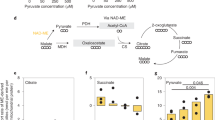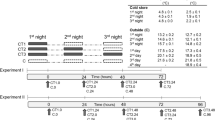Abstract
THE occurrence of malonic acid has been reported in the leaves of lucerne1 and in green wheat plants2. This acid is well known as a competitive inhibitor of succinic dehydrogenase, and has been used extensively in investigations of the tricarboxylic acid cycle. In consideration of this inhibiting effect of the acid, some further investigations have been made into its presence in plants.
This is a preview of subscription content, access via your institution
Access options
Subscribe to this journal
Receive 51 print issues and online access
$199.00 per year
only $3.90 per issue
Buy this article
- Purchase on Springer Link
- Instant access to full article PDF
Prices may be subject to local taxes which are calculated during checkout
Similar content being viewed by others
References
Turner, W. A., and Hartman, A. M., J. Amer. Chem. Soc., 47, 2044 (1925).
Nelson, E. K., and Hasselbring, H., J. Amer. Chem. Soc., 53, 1040 (1931).
Lugg, J. W. H., and Overell, B. T., Aust. J. Sci. Res., A, 1, 98 (1948).
Buch, M. L., Montgomery, R., and Porter, W. L., Anal. Chem., 24, 489 (1952).
Author information
Authors and Affiliations
Rights and permissions
About this article
Cite this article
BENTLEY, L. Occurrence of Malonic Acid in Plants. Nature 170, 847–848 (1952). https://doi.org/10.1038/170847b0
Issue Date:
DOI: https://doi.org/10.1038/170847b0
This article is cited by
-
Effects of different inhibitors such as malonic acid, Na3PO4 and HgCl2 on uptake of different forms of antimony in rice plant
Plant and Soil (2019)
-
Seven years of repeated cattle manure addition to eroded Chinese Mollisols increase low-molecular-weight organic acids in soil solution
Plant and Soil (2013)
-
Anaerobic degradation of malonatevia malonyl-CoA bySporomusa malonica, Klebsiella oxytoca, andRhodobacter capsulatus
Antonie van Leeuwenhoek (1994)
-
Do tomato plants contain endogenous indoleacetylaspartic acid?
Biologia Plantarum (1983)
Comments
By submitting a comment you agree to abide by our Terms and Community Guidelines. If you find something abusive or that does not comply with our terms or guidelines please flag it as inappropriate.



